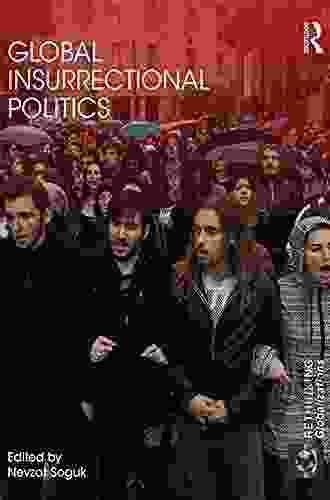Rethinking Globalizations: A Comprehensive Exploration of Global Insurrectional Politics

In the rapidly evolving landscape of global affairs, the rise of insurrectional politics has emerged as a significant force, challenging traditional understandings of globalization and its implications for societies worldwide. This article aims to provide a comprehensive examination of global insurrectional politics, exploring its historical roots, contemporary manifestations, and potential trajectories.
We will begin by defining the concept of global insurrectional politics and tracing its historical evolution. Subsequently, we will analyze its key features, examining the motivations, strategies, and tactics employed by insurrectional movements. Drawing upon case studies from around the world, we will explore the impact of insurrectional politics on local, regional, and global contexts.
4.4 out of 5
| Language | : | English |
| File size | : | 1131 KB |
| Text-to-Speech | : | Enabled |
| Screen Reader | : | Supported |
| Enhanced typesetting | : | Enabled |
| Word Wise | : | Enabled |
| Print length | : | 153 pages |
Furthermore, we will engage with theoretical frameworks that seek to explain the causes and consequences of global insurrectional politics. By considering different perspectives, we will gain a deeper understanding of the factors driving this phenomenon and its implications for the future of globalization.
Finally, we will conclude by reflecting on the challenges and opportunities presented by global insurrectional politics. We will assess its potential for transformative change and discuss the need for innovative approaches to address the complex issues it raises.
Defining Global Insurrectional Politics
Global insurrectional politics refers to a form of political resistance that seeks to challenge and overthrow established political and economic systems through non-conventional means. It encompasses a wide range of activities, including armed uprisings, mass protests, civil disobedience, and other forms of direct action.
Insurrectional movements are often characterized by their rejection of traditional political institutions and processes. They view these institutions as corrupt, unresponsive, and serving the interests of a narrow elite. Instead, they seek to create alternative structures and forms of governance that are more responsive to the needs of the people.
Global insurrectional politics is distinct from traditional forms of political dissent in several respects. First, it is not limited to a particular geographical location or political system. Insurrectional movements have emerged in countries with diverse political and economic conditions, from authoritarian regimes to established democracies.
Second, global insurrectional politics often transcends national boundaries. Insurrectional movements frequently form alliances with similar movements in other countries, sharing strategies, resources, and ideas. This transnational dimension has given rise to a global network of resistance, blurring the lines between local and global politics.
Third, global insurrectional politics is often driven by a deep sense of injustice and inequality. Insurrectional movements argue that the current global system is fundamentally unfair and benefits a small minority at the expense of the majority. They seek to create a more just and equitable world order.
Historical Evolution of Global Insurrectional Politics
The roots of global insurrectional politics can be traced back to the early stages of globalization. As capitalism and colonialism expanded across the world, they created new forms of exploitation, oppression, and inequality.
In response, resistance movements emerged to challenge these injustices. These movements often took the form of armed uprisings, such as the Haitian Revolution (1791-1804) and the Indian Rebellion of 1857.
In the 20th century, global insurrectional politics continued to evolve, influenced by the rise of socialism, communism, and anti-colonial movements. Insurrectional movements played a key role in the decolonization of Africa and Asia, as well as the overthrow of authoritarian regimes in Latin America and Eastern Europe.
In recent years, global insurrectional politics has taken on new forms, driven by factors such as the rise of neoliberalism, the global financial crisis, and the increasing use of social media.
Today, insurrectional movements are active in every region of the world, from the Arab Spring uprisings in the Middle East to the Occupy movement in the United States. These movements represent a diverse range of political ideologies and objectives, but they share a common desire for transformative change.
Key Features of Global Insurrectional Politics
Global insurrectional politics is characterized by several key features:
- Rejection of Established Institutions: Insurrectional movements reject traditional political institutions and processes, viewing them as corrupt and unresponsive. They seek to create alternative structures and forms of governance that are more responsive to the needs of the people.
- Non-Conventional Tactics: Insurrectional movements often employ non-conventional tactics, such as armed uprisings, mass protests, civil disobedience, and other forms of direct action. They believe that conventional political methods are ineffective in bringing about meaningful change.
- Transnational Connections: Insurrectional movements frequently form alliances with similar movements in other countries, sharing strategies, resources, and ideas. This transnational dimension has given rise to a global network of resistance, blurring the lines between local and global politics.
- Focus on Social Justice: Global insurrectional politics is often driven by a deep sense of injustice and inequality. Insurrectional movements argue that the current global system is fundamentally unfair and benefits a small minority at the expense of the majority. They seek to create a more just and equitable world order.
These features distinguish global insurrectional politics from traditional forms of political dissent and make it a transformative force in the global landscape.
Case Studies: Global Insurrectional Politics in Action
To illustrate the key features of global insurrectional politics, we will now examine three case studies from different regions of the world:
- The Zapatista Movement in Mexico: The Zapatista movement is an indigenous resistance movement that emerged in the southern Mexican state of Chiapas in 1994. The Zapatistas reject the Mexican government and its neoliberal policies, which they argue have marginalized and impoverished indigenous communities.
- The Arab Spring Uprisings: The Arab Spring uprisings were a wave of anti-authoritarian protests that swept across the Middle East and North Africa in 2011. These uprisings were largely spontaneous and leaderless, and they employed a variety of tactics, including mass protests, civil disobedience, and social media activism.
- The Occupy Movement: The Occupy movement was a global protest movement that began in New York City in 2011. The Occupy movement targeted the global financial system and its role in creating economic inequality. The movement employed a range of tactics, including mass protests, occupations of public spaces, and online activism.
These case studies demonstrate the diversity and complexity of global insurrectional politics. Insurrectional movements can arise in different political contexts and employ a variety of tactics to achieve their objectives.
Theoretical Frameworks: Explaining Global Insurrectional Politics
To understand the causes and consequences of global insurrectional politics, we need to engage with different theoretical frameworks. These frameworks provide analytical tools that help us make sense of this complex phenomenon.
One influential theoretical framework is dependency theory. Dependency theory argues that global insurrectional politics is a response to the exploitation and inequality created by the global capitalist system. Insurrectional movements seek to break free from the dependency relationships that keep them marginalized and impoverished.
Another important theoretical framework is social movement theory. Social movement theory focuses on the dynamics of social movements, including their origins, development, and impact. This framework can help us understand how insurrectional movements organize, mobilize, and sustain themselves.
Finally, postcolonial theory provides a valuable lens for analyzing global insurrectional politics. Postcolonial theory examines the legacy of colonialism and its impact on contemporary societies. This framework can help us understand the ways in which insurrectional movements are shaped by historical experiences of oppression and exploitation.
By drawing upon these and other theoretical frameworks, we can gain a deeper understanding of the causes and consequences of global insurrectional politics.
Impact and Implications of Global Insurrectional Politics
Global insurrectional politics has a significant impact on local, regional, and global contexts. These impacts can be both positive and negative:
- Positive Impacts: Insurrectional movements can play a transformative role in society. They can challenge authoritarian regimes, promote social justice, and create alternative forms of governance. In some cases, insurrectional movements have even led to the overthrow of oppressive regimes and the establishment of more democratic societies.
- Negative Impacts: Insurrectional movements can also have negative consequences. They can lead to violence, instability, and the breakdown of law and order. In some cases, insurrectional movements have been co-opted by authoritarian leaders who use them to suppress dissent and consolidate their power.
It is important to note that the impact of global
4.4 out of 5
| Language | : | English |
| File size | : | 1131 KB |
| Text-to-Speech | : | Enabled |
| Screen Reader | : | Supported |
| Enhanced typesetting | : | Enabled |
| Word Wise | : | Enabled |
| Print length | : | 153 pages |
Do you want to contribute by writing guest posts on this blog?
Please contact us and send us a resume of previous articles that you have written.
 Novel
Novel Page
Page Text
Text Story
Story Genre
Genre Reader
Reader Library
Library Paperback
Paperback E-book
E-book Magazine
Magazine Paragraph
Paragraph Sentence
Sentence Bookmark
Bookmark Shelf
Shelf Bibliography
Bibliography Synopsis
Synopsis Tome
Tome Library card
Library card Autobiography
Autobiography Reference
Reference Encyclopedia
Encyclopedia Thesaurus
Thesaurus Narrator
Narrator Character
Character Resolution
Resolution Catalog
Catalog Borrowing
Borrowing Archives
Archives Periodicals
Periodicals Research
Research Lending
Lending Reserve
Reserve Academic
Academic Reading Room
Reading Room Special Collections
Special Collections Interlibrary
Interlibrary Literacy
Literacy Reading List
Reading List Book Club
Book Club Textbooks
Textbooks S H Fernando Jr
S H Fernando Jr Hudson Press
Hudson Press Melanie Murphy
Melanie Murphy Nanette O Neal
Nanette O Neal Diane A Ladley
Diane A Ladley Alfred Frederick Pollock Harcourt
Alfred Frederick Pollock Harcourt James D Boys
James D Boys Shannon Shaw
Shannon Shaw Pieter Waterdrinker
Pieter Waterdrinker Karoline Dahrling Hughes
Karoline Dahrling Hughes Eve Roxburgh
Eve Roxburgh Beda S
Beda S Michael Kaufman
Michael Kaufman Rebecca Wells
Rebecca Wells Jodi Brandstetter
Jodi Brandstetter Colin James
Colin James John E Finn
John E Finn Alice Birch
Alice Birch Henry James
Henry James Allen Anderson
Allen Anderson
Light bulbAdvertise smarter! Our strategic ad space ensures maximum exposure. Reserve your spot today!

 Darren NelsonEyes Bottle Dark With Mouthful Of Flowers: A Symbolism of Loss, Mortality,...
Darren NelsonEyes Bottle Dark With Mouthful Of Flowers: A Symbolism of Loss, Mortality,... Cooper BellFollow ·10.3k
Cooper BellFollow ·10.3k Cody BlairFollow ·7.6k
Cody BlairFollow ·7.6k Evan SimmonsFollow ·4.3k
Evan SimmonsFollow ·4.3k Ethan MitchellFollow ·7.4k
Ethan MitchellFollow ·7.4k Ernest PowellFollow ·11.8k
Ernest PowellFollow ·11.8k Lee SimmonsFollow ·9k
Lee SimmonsFollow ·9k William GoldingFollow ·18.7k
William GoldingFollow ·18.7k John Dos PassosFollow ·10.3k
John Dos PassosFollow ·10.3k

 Vernon Blair
Vernon BlairHow to Get a Woman to Pay for You: A Comprehensive Guide...
In the modern dating...

 Levi Powell
Levi PowellPrinciples and Theory for Data Mining and Machine...
Data mining and machine learning are two...

 Andrew Bell
Andrew BellMirrors For The Mind: Milestones In Discovery And...
Mirrors have been a part of human history...

 Alec Hayes
Alec HayesDelving into Natural Language Processing with Java and...
Natural Language Processing (NLP) is an...
4.4 out of 5
| Language | : | English |
| File size | : | 1131 KB |
| Text-to-Speech | : | Enabled |
| Screen Reader | : | Supported |
| Enhanced typesetting | : | Enabled |
| Word Wise | : | Enabled |
| Print length | : | 153 pages |














